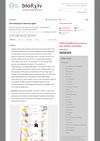
Continuous research and innovative strategies are essential for sustainable development.
 September 2023 in “Medicine”
September 2023 in “Medicine” The research suggests immune system changes and specific gene expression may contribute to male hair loss, proposing potential new treatments.
 August 2023 in “Han'gug miyong haghoeji/Journal of the Korean society of cosmetology”
August 2023 in “Han'gug miyong haghoeji/Journal of the Korean society of cosmetology” More research is needed on natural hair products, especially clinical studies.
 August 2023 in “bioRxiv (Cold Spring Harbor Laboratory)”
August 2023 in “bioRxiv (Cold Spring Harbor Laboratory)” The research found that specific stem cells maintain skin gland openings and that disrupting their activity can cause blockages or early cancer signs, indicating a need for targeted treatments.
 August 2023 in “Skin Research and Technology”
August 2023 in “Skin Research and Technology” Platelet-rich plasma (PRP) may improve healing in chronic wounds and vitiligo and promote hair regrowth, but more research is needed.
 July 2023 in “Aesthetic Plastic Surgery”
July 2023 in “Aesthetic Plastic Surgery” More research is needed to confirm if Platelet-Rich Plasma (PRP) is effective for treating hair loss.
 July 2023 in “International journal of trichology”
July 2023 in “International journal of trichology” The research found no clear link between the severity of male baldness and the scalp examination findings in Indonesian men.
 July 2023 in “Nasza Dermatologia Online”
July 2023 in “Nasza Dermatologia Online” More research is needed on CCCA in children, especially Black and Asian adolescents.

The research identified key molecules that help hair matrix and dermal papilla cells communicate and influence hair growth in cashmere goats.
 May 2023 in “IntechOpen eBooks”
May 2023 in “IntechOpen eBooks” More research is needed to understand how testosterone is maintained in adult males.
 May 2023 in “Materials research foundations”
May 2023 in “Materials research foundations” Nanomaterials like silver and gold can improve wound healing but need more research for safety.
 May 2023 in “Clinical, Cosmetic and Investigational Dermatology”
May 2023 in “Clinical, Cosmetic and Investigational Dermatology” The research found proteins in human skin cells that help with wound healing and hair growth, which could lead to new treatments.
 April 2023 in “Journal of Investigative Dermatology”
April 2023 in “Journal of Investigative Dermatology” The research mapped gene activity in developing mouse skin and found key markers for skin cell types and changes from fetal to early postnatal stages.
 April 2023 in “Journal of Investigative Dermatology”
April 2023 in “Journal of Investigative Dermatology” The research updated the skin cell profile, finding new skin cell markers and showing fibroblasts' key role in skin health.
 April 2023 in “Journal of Investigative Dermatology”
April 2023 in “Journal of Investigative Dermatology” The research shows that skin cancer likely originates from hair follicles and that certain cell populations expand to promote skin cancer growth.
 April 2023 in “Journal of Investigative Dermatology”
April 2023 in “Journal of Investigative Dermatology” The research found that certain factors in hair follicle cells control hair growth and development, and these could be used to create new treatments for hair loss.
 April 2023 in “Journal of Investigative Dermatology”
April 2023 in “Journal of Investigative Dermatology” The research found that a protein called PPARg is important for the formation and healing of sebaceous glands, which can regenerate independently from hair follicles.
 April 2023 in “Journal of Investigative Dermatology”
April 2023 in “Journal of Investigative Dermatology” The research developed methods to test drugs that could protect and restore hair follicle protection in a hair loss condition.
 April 2023 in “Journal of Investigative Dermatology”
April 2023 in “Journal of Investigative Dermatology” The research found that a protein called caveolin-1 is reduced in psoriasis, but reintroducing it can help alleviate some psoriasis symptoms.
 April 2023 in “The journal of investigative dermatology/Journal of investigative dermatology”
April 2023 in “The journal of investigative dermatology/Journal of investigative dermatology” The research identified unique metabolic activities in immune cells associated with hair loss in Alopecia Areata.
 April 2023 in “Medizinische Genetik”
April 2023 in “Medizinische Genetik” New research has found 14 genes linked to the risk of developing alopecia areata, improving understanding and treatment options.
 November 2022 in “Scientific Data”
November 2022 in “Scientific Data” The research identified genes and non-coding RNAs in cells that could be affected by testosterone, which may help understand hair loss and prostate cancer.
 November 2022 in “The journal of investigative dermatology/Journal of investigative dermatology”
November 2022 in “The journal of investigative dermatology/Journal of investigative dermatology” The research identified specific genes that are active in the cells crucial for hair growth.
 November 2022 in “Journal of Investigative Dermatology”
November 2022 in “Journal of Investigative Dermatology” The research found specific genes that are more active in balding cells, which could be causing hair loss.
 October 2022 in “Frontiers in Genetics”
October 2022 in “Frontiers in Genetics” The research found new potential mechanisms in mouse hair growth by studying RNA interactions.
 October 2022 in “Legume Research”
October 2022 in “Legume Research” The research found a way to grow plant tissue and analyze compounds in Bituminaria bituminosa, which is promising for hair restoration treatments.
 September 2022 in “bioRxiv (Cold Spring Harbor Laboratory)”
September 2022 in “bioRxiv (Cold Spring Harbor Laboratory)” The research provided new insights into the genetic factors contributing to hair loss and skin conditions by analyzing individual cells from the human scalp.
 September 2021 in “Clinical research in dermatology”
September 2021 in “Clinical research in dermatology” 5-Alpha-Reductase inhibitors might help slow down hair loss in Frontal Fibrosing Alopecia but are not a primary treatment and need more research.
 September 2021 in “European Neuropsychopharmacology”
September 2021 in “European Neuropsychopharmacology” The research explores how gut bacteria and sleep patterns are related in mental health disorders.
 September 2021 in “Physiology News”
September 2021 in “Physiology News” Increasing research diversity is key for better understanding and treating Parkinson's Disease.






























